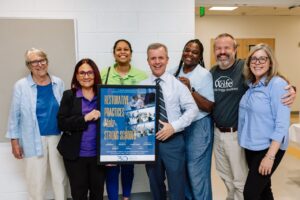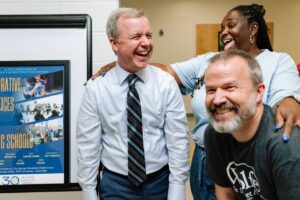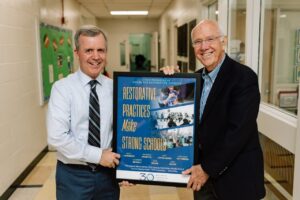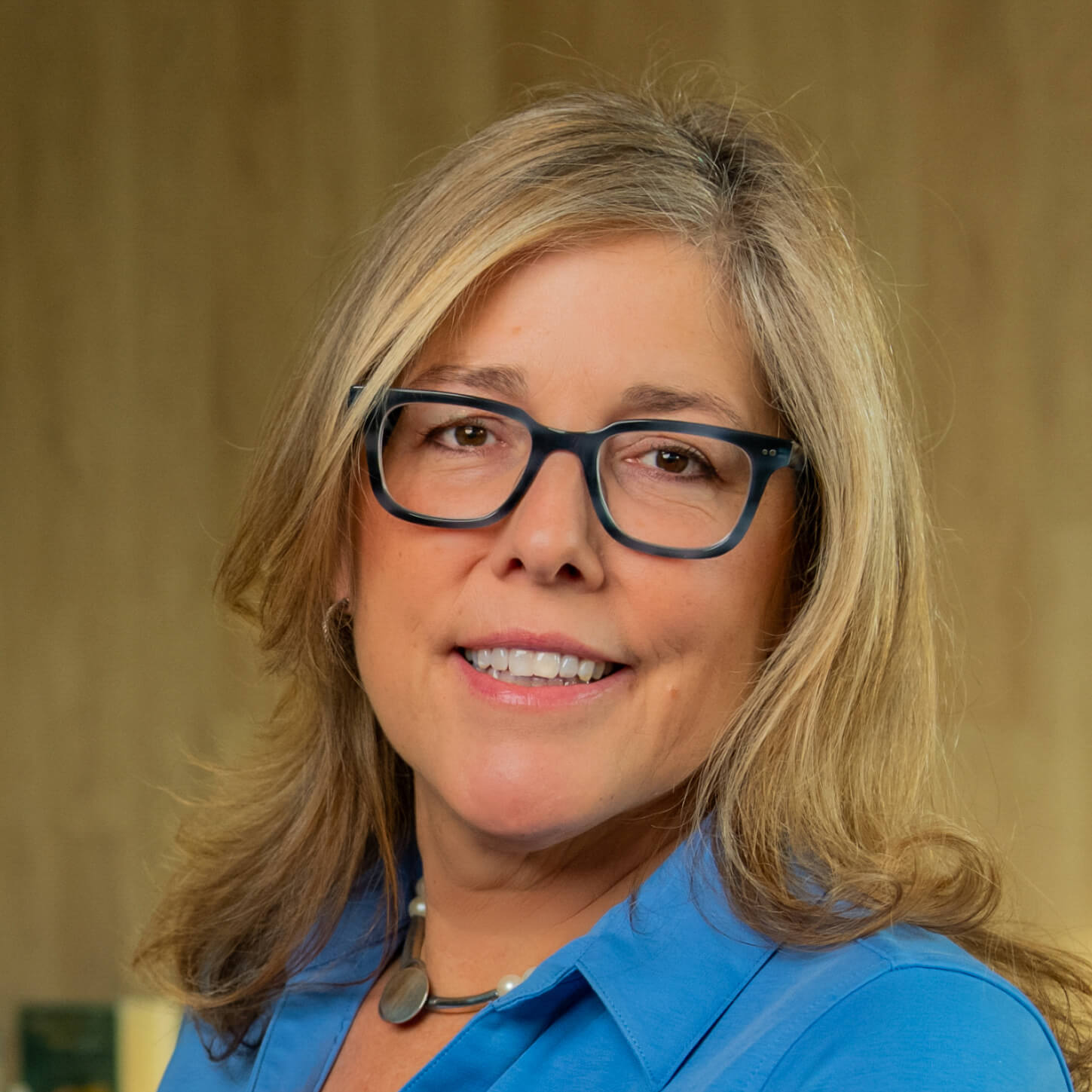To celebrate National Principals’ Month at Baltimore Curriculum Project (BCP), we interviewed one of our six amazing Principals from our network of neighborhood conversion charter schools.

With his mentor Dr. Berkeley and his brother Mark Gaither, Principal, Wolfe Street Academy
Matt Hornbeck, Principal of Hampstead Hill Academy (HHA) in the Canton neighborhood of Baltimore City, is in his 23rd year at the helm of HHA. He began his tenure when BCP was also just getting started as a charter school organization.
Mr. Hornbeck first met Dr. Muriel Berkeley in 1990 while teaching in Baltimore. Over the years, he followed her work closely as she founded BCP and researched and brought Direct Instruction (DI) to Baltimore City Public Schools. By 2002, Mr. Hornbeck was working as an education consultant to large school districts and preparing for the next step in his career—becoming a principal at a public school. That’s when he received a phone call from Dr. Berkeley encouraging him to apply for the principal position at Hampstead Hill.
Mr. Hornbeck was a natural for the position (see end of blog post) with his experience and deep Baltimore roots. He and his brother Mark Gaither, Principal of Wolfe Street Academy were raised in Baltimore and attended City College for high school and grew up with an understanding of the impact of public education. Their father, David Hornbeck, founder of Voices for Restorative Schools, served as state superintendent of the Maryland State Department of Education, and their mother, Becky, was a program officer at the Baltimore Community Foundation.
We talked with Mr. Hornbeck about his path to BCP and how his role as Principal has evolved over his tenure at HHA. What follows are his words and insight:
 I started at HHA in 2003 when there were no charter schools in Maryland. HHA was part of BCP, which was supporting a number of schools as part of the “New School Initiatives” program with Baltimore City Public Schools. Maryland passed a charter law in 2005, which was when HHA became a neighborhood conversion charter school operated by BCP.
I started at HHA in 2003 when there were no charter schools in Maryland. HHA was part of BCP, which was supporting a number of schools as part of the “New School Initiatives” program with Baltimore City Public Schools. Maryland passed a charter law in 2005, which was when HHA became a neighborhood conversion charter school operated by BCP.
I met Muriel [Berkeley] in 1990 on a trip through the Fund for Educational Excellence for teachers to go to Snowbird, Utah for a conference on school improvement. Years later, when I was living in Philadelphia and consulting, she began having conversations with me about running a BCP school. I’d been in other districts and seen that, for me, the central office was not where the action was. You need to be in the schools to make things happen. In December 2002, HHA’s longtime former Principal was retiring, and Dr. Berkeley asked me to put my name in the pool. When I was selected in spring 2003, she went on to become one of the all-time great mentors in my life.

Sept. 2025 Restorative Practices film premiere (l. to r.) Dr. Muriel Berkeley, Dr. Rhonda Richetta, Matt Hornbeck, Tetra Jackson, Bernarda Kwaw, Mark Gaither, Laura Doherty
Before taking the role, I was familiar with DI. I knew some of the key players in the national DI movement and had been hired as a consultant to do an analysis of the educational programs of six schools implementing DI in Toledo, Ohio. I had three things going for me as HHA Principal: 1) I was a graduate of Baltimore City Schools; 2) I knew Muriel; and 3) I knew DI through my consulting work. When I was a teacher, I had experience implementing a research-based program.
Early on, I realized that it would be very hard to be a Principal. I knew I needed to have a strong network. I had some advantages in knowing the system. Baltimore is very quirky, and being a City College graduate means something here. I knew a lot of people at North Avenue because I’d been a City Schools teacher, and my father had been the state superintendent. I was able to make connections with people that would’ve taken years in another district. Another connection was with the Abell Foundation, which funded some of the work I’d done as co-founder of the Baltimore Shakespeare Festival, a partnership between Center Stage and the Folger Shakespeare Library. Bob Embry, Abell Foundation president, really lit that fire under me to get certified and pushed me in the direction of becoming a principal.
The principalship is the best blend of policy and practice that you can possibly imagine. I get to work on larger issues like literacy and curriculum. I can see how our school is doing against lagging indicators like chronic absenteeism. Our chronic absenteeism rate is very low, at 9.9%. Our academic growth rate in disaggregated groups is amazing. Our Black students in HHA’s middle school are performing in the 89th percentile in math as compared statewide with all students, not just against their demographic in Baltimore City or in Maryland. In my role, I can focus on the larger issues and read to four- and five-year-olds, and then participate in a Leaders Go Places event at HHA for our middle school.

With his Hampstead Hill colleagues
I think of my role as Principal as a talent manager. If you want your heart and mind to align and be in flow at work, you’ve got to work in a place where you feel supported. My first few years, I had to figure out the systems and how to support our teachers through those systems. We solved the issue of them spending their own money to make copies by budgeting copy machines every year. We figured out a more efficient system to track personal time. But working is an emotional thing. People don’t leave jobs. They leave managers. It doesn’t make sense if I’m leading too far ahead and turn around and nobody’s there. I don’t really operate by consensus, but I’m constantly talking with my leadership team because I don’t like surprises, BCP doesn’t like surprises, and parents don’t like surprises. We are constantly talking about what didn’t work out well. How can we not do that again? What should have happened?

With fellow BCP Principals Bernarda Kwaw (Govans) and Mark Gaither (Wolfe Street Academy)
One of the reasons I’ve stayed at HHA and with BCP is the autonomy principals have to make decisions that best serve their school communities. Having the flexibility to manage hiring and budgets in ways that reflect our school’s unique needs has been essential to our success. It allows for thoughtful planning, stronger alignment among staff, and ultimately, better outcomes for students. Muriel and Laura [Doherty, BCP President and CEO following Dr. Berkeley] have always empowered principals to make choices grounded in what works best for their schools—an approach that has proven both forward-thinking and effective.
Initially, I thought my job was about taking away excuses. We have about 50 teachers, and we have about 50 people, including me, who are trying to keep everything as calm as it can be in the classroom so that those teachers can do what they need to do. Dick Elmore [professor emeritus, Harvard Graduate School of Education] talked about the relationship between three things that are essential to learning, that are part of what he called the instructional core: the relationship between the teacher, the student, and the content.
 Once you start thinking about that, then you realize that you can’t break up classes if a teacher is out or pull someone else to cover a lunch shift because that destroys your instructional model and affects your results. Once you’ve taken all the excuses away and provided all of the supports, the teacher still has a herculean job to do. If they can’t do it after a few years, then it’s my job to counsel them out of the profession. I meet individually with everyone at HHA midyear and at the end of the year to talk, review goals, and get feedback on how I can help them with their job. Every day, I am in the classrooms and in the hallways. I am very much in relationship with our teachers and staff.
Once you start thinking about that, then you realize that you can’t break up classes if a teacher is out or pull someone else to cover a lunch shift because that destroys your instructional model and affects your results. Once you’ve taken all the excuses away and provided all of the supports, the teacher still has a herculean job to do. If they can’t do it after a few years, then it’s my job to counsel them out of the profession. I meet individually with everyone at HHA midyear and at the end of the year to talk, review goals, and get feedback on how I can help them with their job. Every day, I am in the classrooms and in the hallways. I am very much in relationship with our teachers and staff.
I feel very lucky, blessed to have met Muriel and to be connected for 20-plus years to BCP. HHA is a replicable, fantastic school-based model where we have a zone and take everybody in the zone. HHA doesn’t have any additional spots, but when we did, they would go by lottery. Then you pick a good curriculum, and you can stick with it through turnover at the district. Principals are actually supported by the [teacher] union rules in not constantly deciding whether this person or that person should go or stay. There’s good tension in building a staff that includes both early and late career teachers. Being able to build a pre-K addition and a gym largely with money that we have saved and raised has been rewarding as well. I can say “yes” to most everything, whether it’s sending students to Outward Bound or North Bay or student trips to Costa Rica and Peru. In June, HHA is taking 30 students to the Galapagos.

With his father, David Hornbeck, founder of Voices for Restorative Schools
My biggest accomplishment is ensuring staff have fulfilling and joyful jobs, and students have a rewarding academic experience. Parents trust us with the most important thing in their life—their child—for six hours and 45 minutes every day, which is just mind-blowing. Carefully implementing DI and Restorative Practices also ensures that all the kids can read by the time they leave Kindergarten so that they can do math, social studies, and science. If phonemic awareness, fluency, and accuracy are strong enough that students can comprehend what they read, you can start building on all of their experiences and prior knowledge. Then things really start clicking!
Thank you, Mr. Hornbeck, for over two decades of service to, leadership of, and vision for Hampstead Hill Academy!
Watch Mr. Hornbeck in the new documentary, Restorative Practices Make Strong Schools.
 Mr. Hornbeck’s Journey to HHA Principal
Mr. Hornbeck’s Journey to HHA Principal
- Attended Baltimore City public elementary, middle school, and high school (Baltimore City College)
- B.S., Bowdoin College, B.S.
- J.D., University of Maryland, Carey School of Law
- M.Ed., Temple University
- Worked in the early 1990s as a junior staffer on Capitol Hill for Dr. Marion Wright Edelman, founder of the Children’s Defense Fund, on childcare issues
- Gifted and Advanced Learning teacher, Hartford Heights Elementary School, Baltimore City Public Schools
- Post law school, worked as senior program associate, Council of Chief State School Officers on Capitol Hill, on a 35-state Improving High Poverty Schools Project
- Consultant for large urban districts on professional development for principals and budget analysis
- Helped design Fair Student Funding and was a member of the collective bargaining team that negotiated a performance-based teacher’s contract
- Became HHA Principal in 2003

